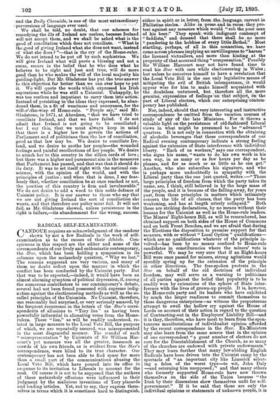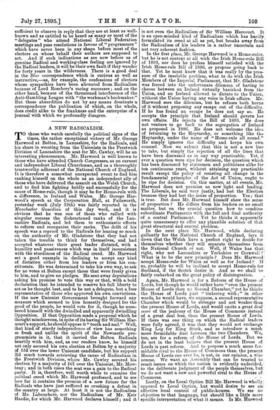RADICAL SELF-EXAMINATION.
CANDOUR requires an acknowledgment of the candour shown by not a few Radicals in the work of self- examination as to the causes of their delocicle. Con- spicuous in this respect are the editor and some of the correspondents of our lively and enthusiastic contemporary, the Star, which has been holding a symposium in its columns upon the melancholy question, " Why we lost." The reasons suggested are very various, and many of them no doubt reflect upon the manner in which the conflict has been conducted by the Unionist party. But that was to be expected,—indeed, it would have been an almost alarming symptom of political depression, if, among the numerous contributors to our contemporary's debate, several had not been found possessed with supreme indig- nation against the electioneering methods as well as the so- called principles of the Unionists. No Unionist, therefore, can reasonably feel surprised, or very seriously amazed, by the frequent recurrence in the letters of the Star's corre- spondents of allusions to " Tory lies " as having been powerfully influential in alienating votes from the Home- rulers. These " lies," as will be readily understood, re- lated in large measure to the Local Veto Bill, the purpose of which, we are repeatedly assured, was misrepresented in the most disgraceful manner. The scandal of such " misrepresentation " by Unionists of Sir William Har- court's pet measure was all the greater, inasmuch as crowds of his own friends, as is evident from the Star's correspondence, were blind to its true character. Our contemporary has not been able to find space for more than a small part of the communications abusing the Local Veto Bill, which have poured into its office in response to its invitation to Liberals to account for the rout. Of course it is not to be supposed that the authors of these melancholy effusions were influenced in their judgment by the malicious inventions of Tory placards and leading articles. Yet, sad to say, they express them- selves in terms which it is sometimes hard to distinguish, either in spirit or in letter] from; She: language, current in Philistine circles. Alike in prase and in verse , they pro- test against any measure which would "rob the poor man of his beer!' They speak, with indignant contempt of " faddists," and demand that there shall be no more " pandering to the, hobbies of every little BetheL" Most startling, perhaps, of all in this connection, we have come across phrases implying an unwillingness to "harass " the licensed victuallers, and more than hinting at the propriety of that accursed thing " compensation." Possibly Sir William Harcourt may not have found time to read his Star with care while electioneering in Wales ; but unless he conceives himself to have a revelation that the. Local Veto Bill is the one only legislative means of mitigating the evil of British intemperance, it would appear wise for him to _ make himself acquainted with the , doubtless untutored, but therefore all the niore gdnuitie,' expressions of feeling&ter 'that subject, 6n-the part of Liberal electors, which our enterprising contem- porary has published. , Nor, indeed;'should that very interesting and instructive correspondence be omitted from the vacation courses of study of any of the late 'Ministers. For it • throws a valuable light on the persistence of old-fashicaidd Liberal views in what might be presumed to be " advanced " quarters. It is not only in connection with the obtaining of alcoholic beverages that these correspondents of our Radical evening contemporary indicate a strong feeling against the extension of State interference with individual liberty. " Each of us workers," says one correspondent, who signs his name, " wants to do his own work in his own way, in as many or as few hours per day as he pleases, and for as much or as little as he can get." Another, who also subscribes his signature, and who is perhaps more undoubtedly in sympathy with the Liberal party than' the one just quoted, writes :—" Those large principles of freedom from which the party takes its name, are, I think, still believed in by the large mass of the people, and it is because of the falling-away, for years past, from those principles in matters which intimately concern the life of all classes, that the party has been weakening, and has at length utterly collapsed." Both these are striking declarations, by no means without their lessons for the Unionist as well as the Home-rule leaders. The Miners' Eight-hours Bill, as will be remembered, has obtained support on both sides of the House of Commons and on both Front Benches, and we are afraid. that daring the Elections the disposition to promise support for' that measure, with or without " Local Option " qualifications— which are no qualifications whatever of the principle in- volved—has been by no means confined. to Home-rule candidates in constituencies where the miners' vote is powerful. We may be very sure that if an Eight-hours Bill were once passed for miners, strong agitations would speedily spring up for the extension of the principle in other directions. The free-spoken protests in the Star on behalf of the old doctrines of individual freedom, may well serve as a warning to politicians of all parties against the belief that popularity is to be readily won by extensions of the sphere of State inter- ference with the lives of grown-up people. It is, however, the Home-rule party and its leaders who have exhibited. by much the larger readiness -to commit themselves to these dangerous enterprises—as witness the preposterous attempt to swell the hollow cry against the House of Lords on account of their action in regard to the question of Contracting-out in the Employers' Liability Bill—and it is they, therefore, who have most to' learn from the spon- taneous manifestations of individualist opinion afforded by the recent correspondence in the Star. Ex-Ministers may also learn from the same source 'that in the opinion of one correspondent " a great number of electors do not care for the Disestablishment of the Church, as so many of the churches are endowed with private endowments.' They may learn further that many law-abiding English Radicals have been driven into the Unionist camp by the spectacle of " an important city like Limerick select- ing a felon of the worst type—to wit, John Daly —and returning him unopposed ; and that many others who formerly supported Home-rule have now thrown themselves on the side of the Union because "the Irish by their dissensions show themselves unfit for self- government." If it be said that these are only the individual opinions or statements of unknown people, it is sufficient to observe in reply that they are at least as well- known and as entitled to be heard as many or most of the " delegates " who attend National Liberal Federation meetings and pass resolutions in favour of " programmes " which have never been in any shape before most of the electors on whose behalf their authors are supposed to act. And if such indications as are now before us of genuine Radical and working-class feeling are ignored by the Radical leaders, it will be their own fault if they wander for forty years in the wilderness. There is a good deal in the Star correspondence which is curious as well as instructive,—as, for example, the confessions of electors whose sympathies have been alienated from Radicalism because of Lord Rosebery's racing successes ; and on the other hand, because of the threatened interference of the Anti-Gambling League with " the workman's bookmaker." But these absurdities do not by any means dominate a correspondence the publication of which, on the whole, does credit alike to the frankness and the enterprise of a journal with which we profoundly disagree.



































 Previous page
Previous page